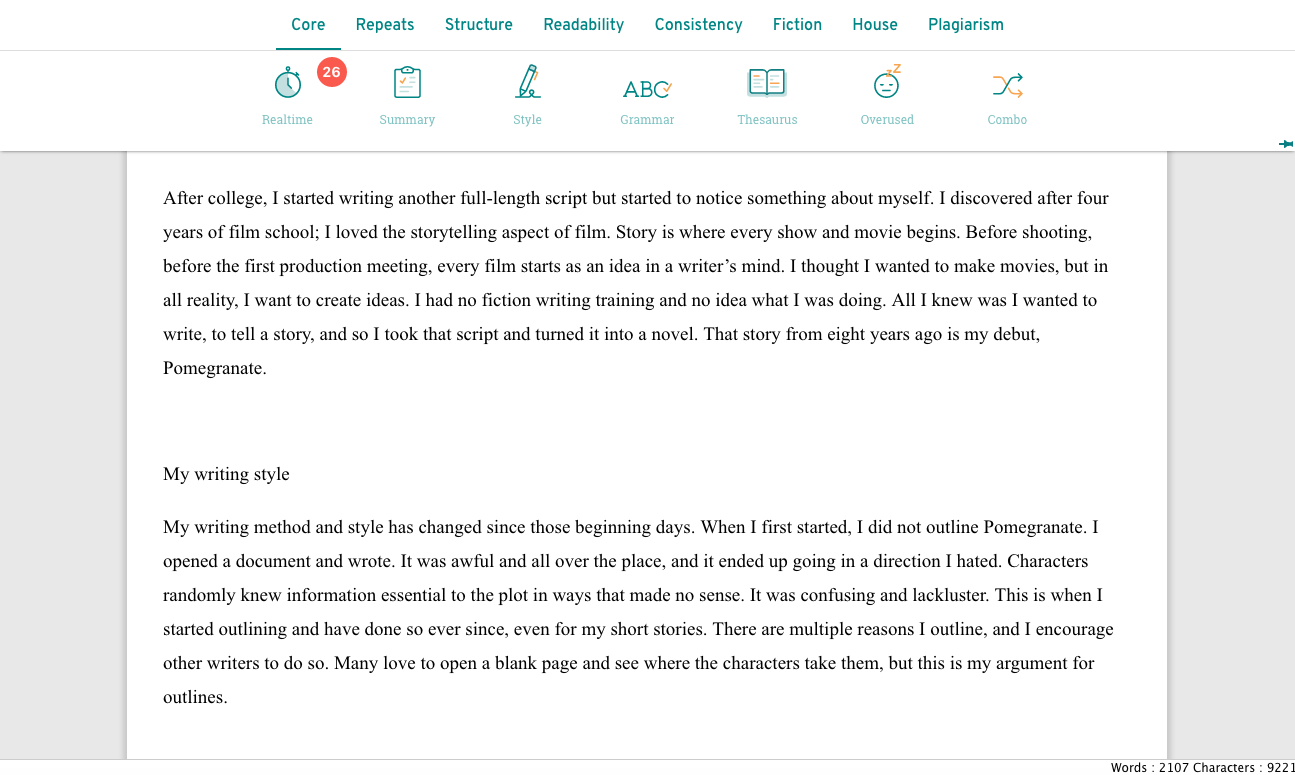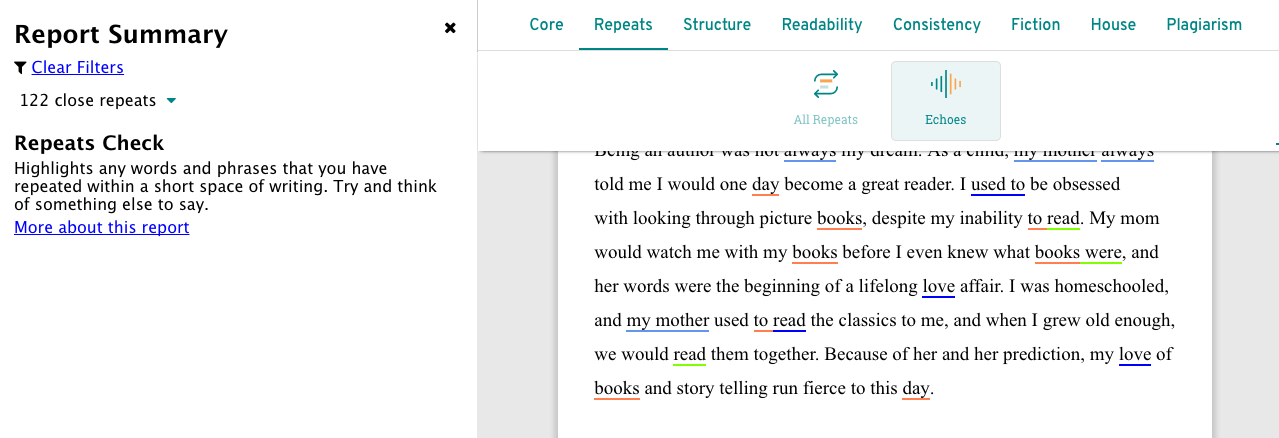
My name is Nicole Scarano, and I am an indie author with one novel published and the sequel due later this year. This fact is incredible to me, because eight years ago having a published book with my name on it was nothing more than a fantasy. I never thought it would happen, yet here I am about to publish for the second time with no intention of stopping.
Where Did It All Begin?
Being an author was not always my dream. As a child, my mother told me I would one day become a great reader. I was obsessed with looking through picture books, despite my inability to read. My mom would watch me with them before I even knew what books were, and her words were the beginning of a lifelong love affair. I was homeschooled, and my mother used to read the classics to me, and when I grew old enough, we read them together. Because of her and her prediction, my love of books and storytelling run fierce to this day. In this photo, I'm passing my love of books on to my little sister.

Even though books were always my faithful companions, my dream was to work in film. In high school I wrote my first full-length screenplay and my second in college as an independent study. In college I also directed my first budgeted short film, interned with Jerry Bruckheimer films, and then went on to get a job as a video editor with a major tech company (a job I still have).
After college, I started another full-length script but noticed something about myself. I discovered after four years of film school that I loved the storytelling aspect of film. Story is where every show and movie begins. Before shooting, before the first production meeting, every film starts as an idea in a writer’s mind. I thought I wanted to make movies, but in all reality, I want to create ideas. I had no fiction writing training and no clue what I was doing. All I knew was I wanted to write, to tell a story, and so I took that script and turned it into a novel. That story from eight years ago is my debut, Pomegranate.
My Writing Style
My writing method and style has changed since those early days. When I first started, I did not outline Pomegranate. I opened a document and wrote. It was awful and all over the place, and it ended up going in a direction I hated. Characters randomly knew information essential to the plot in ways that made no sense. It was confusing and lackluster.
This is when I started outlining and have done so ever since, even for my short stories. There are multiple reasons I outline, and I encourage other authors to do so. Many love to open a blank page and see where the characters take them, but this is my argument for outlines.
Four Reasons Writers Should Embrace the Outline
1. It’s hard to keep track of complex narratives
The first reason is somewhat specific to my book, but other authors I am sure have similar stories or issues. Pomegranate and its sequels are reinventions of Greek mythology, an origin story of sorts, but it is also a three-novel plot that follows its own narrative that I created.
It is based on the idea that in the beginning, Hades was not a god but an immortal woman, and when her love, Zeus, betrays her and casts her from Olympus, she discovers she is destined for a dark and terrible greatness. It largely centers on Hades and Persephone, but I reinvent a lot of the ancient myths, completely reshaping them, and therefore outlines are essential for me. I need to keep track of the real myths and the changes. When you are altering legends, you have to make sure you maintain continuity, and while not everyone has such a complex story, continuity is crucial.
2. It speeds up the writing process
One of the most important reasons I love outlines is that they force you to write an entire book fast. I write my outlines by numbering each scene and writing a paragraph with all the pertinent information. Who is in this scene, where are they, what are they talking about, what are they doing, and is there anything else relevant the reader needs to know? Because it condenses each section into a single paragraph, I can write these quickly in a short document. I am a firm believer that this helps you avoid plot holes and that dreaded, dragging middle. It also helps with continuity. A novel can take months and even years, and that can often result in forgetfulness. If you create the outline rapidly in a few days or weeks, your mind is fresh.
3. You get an overview of the whole project
With a strong outline you can see the plot as a whole on a few pages. When writing a book, scenes can be long, so you might not fully see the pacing. Outlines help you determine if your story is moving too fast, too slow, or if you have repetitive scenes.
This helped me a lot with my sequel, which is in the final editing stages. Without giving away spoilers, a character has violent nightmares. They are important to driving the plot forward and they happen often, but looking at my outline I realized that every other paragraph dealt with them. It was far too repetitive, so I cut some scenes and then added different scenes elsewhere to make the pacing flow better.
4. They help you keep your momentum up
Lastly, if you are anything like me, work and real life impede your writing. I work full time as a video editor, and I have my dog to take care of and exercise daily (but I can’t complain because she is my little light, and the hellhound’s interactions with Hades in Pomegranate is loosely based on her personality). I have a family and a fiancé, and we all know just how much cooking, cleaning, and shopping you have to do every week. Life is busy, and as much as I would love to dedicate all my time to writing, it is not possible.
Outlines are road maps for your narrative, but they are also great for remembering where you left off. If it weren’t for them, I could forget where I was going in the time between my writing sessions. I have taken breaks from my novels to write short stories for contests. I love doing this, and my stories have placed in these contests, but when I get back to the novel after a month off, all I can say is thank god I have this outline reminding me what on earth is going on.
Long story short, I love outlines.
Full Speed Ahead with the First Draft
Once I have my outline, I write the first draft. I do not edit or re-read what I write when I work on this draft. I try to write as well as possible in this draft, but mostly I plunge forward, never looking back. I only read over a section if I need a reminder, but if you look backward, you get caught up in the issues. Just write. Get it done.
Talk it out
During this process I have to work alone since I talk out loud. Ever stuck in your plot? Speak as if you were the characters. It would surprise you how often forcing yourself to speak and come up with answers to your character’s questions fixes your problems. I also find talking to yourself is a great tool in writing dialogue. If you talk out loud as if in a conversation, you will hear the bad dialogue. I talk nonstop in the first draft, so I put on a film score that matches the tone of my WIP and chat away… alone.
How I Learned to Love the Edit
Then on to the dreaded editing. To be honest though, I do not mind it at all.
I love going back over the story and seeing which parts are cringeworthy and which parts are brilliant. I also love editing now that I have discovered ProWritingAid. I used to just change what I didn’t like or what I noticed was wrong when I did revisions, but with ProWritingAid my whole attitude toward the revision process has changed. I am obsessed with this program. In fact, I wrote this entire article in ProWritingAid.

Editing: round one
My first round of edits always fixes the big problems. What is the sentence structure and the grammar like? How is the pacing? Do I need to cut parts out? Add new scenes? Why do I keep repeating the same idea over and over, get to the point!

Editing: round two
The next rounds of edits revolve heavily around descriptions and the quality of the writing and making sure there is enough character emotion. ProWritingAid is essential to me in these stages, and not just because of their grammar service. I always recommend ProWritingAid over other programs because they offer so much more than grammar. You are in control of what you choose to concentrate on instead of it auto-populating what it thinks you need. You choose which area you want help with, and it tells you all you need to know. It helps you become a better writer, and there are a few features I am not sure how I lived without.
Overused words
One of my favorite features in ProWritingAid is the “Overused” tab. It goes through your entire document, or a small section you paste into the editor, and highlights every word you overuse. The program compares it to other published works and recommends how many of these repeated words you should remove. Certain words (like the, or, and) will always be repeated, but this feature looks for bigger offenders that stand out if overused.
I love this because suddenly I realize how many times I write felt in one chapter. It forces you to expand your vocabulary, or make your writing more creative by compelling you to change the sentence. It helps you compose new, interesting sentences. Things I would have never thought to write if ProWritingAid had not pointed out my overuse of plain words.
Echoes
My second favorite feature is the “Echoes” tab, which is related to the Overused tab. The Echoes tab searches your work for words that repeat close together. They may not be ones you use often, but they are words used within the same few sentences. I spend so much time on this tab getting my echos to drop in quantity. Similar to the overused report, it forces your vocabulary to expand, or your writing to be more creative. Whenever I read, and I notice the same words appear often in the same sentence or paragraph, the repetitiveness can bore me. This is especially true in the age of audiobooks. I love them and listen daily, and when narrators repeat stuff, it takes me out of the story.

I listened to a book a while back where two characters were described identically within the same section. It portrayed them with both the exact same words and a feature that was so unique that it stood out to the reader/listener. I was so confused because I thought the audiobook had skipped and went backward, that’s how jarring the identical description was. ProWritingAid would have noticed that right away and pointed it out.
In my first draft, everything was either dark, massive, or desperate. Massive claws, massive hands, massive weapon. Okay, we get it! The Greek gods and monsters are huge! Stop repeating yourself, Nicole! I am sure I would have picked this up a few times on my own, but not to the extent ProWritingAid did. I am so thankful because Hades, Zeus, Kerberos, Chimera, and the River Styx deserve better a word than massive.
Takeaways
ProWritingAid is a brilliant product, one that I feel is essential to any fiction writer. My writing has evolved and grown over the years, but there is always room to improve. ProWritingAid is helping me do that as I finalize Pomegranate’s sequel.
And when this book is finished, it will be on to the next, because as an author you are never done. There is always another story to tell, and I will spend my life trying to finish them all.

